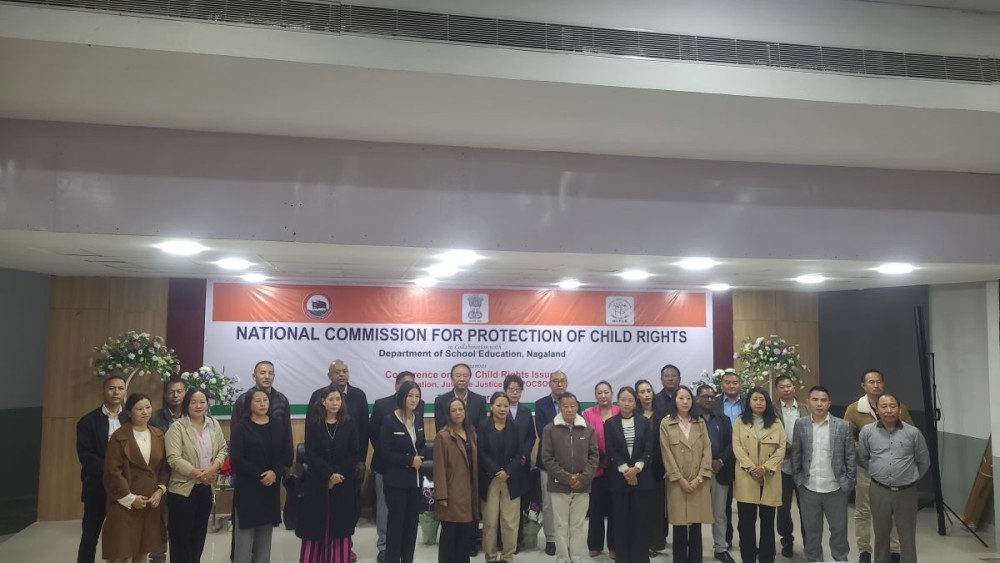Dignitaries and some of the participants of state-level conference on implementation of key child rights legislations in Kohima on November 20. (Morung Photo)

Our Correspondent
Kohima | November 20
A state-level conference on the implementation of key child rights legislations, focusing on education, juvenile justice, and POCSO, was held today at the Capital Convention Centre, Kohima, under the aegis of the National Commission for Protection of Child Rights (NCPCR) in collaboration with the State’s Department of School Education (DSE).
The conference, attended by representatives from the school education department, social welfare, police, and district administration, deliberated on challenges faced by line departments and civil society in ensuring children’s safety and security in schools, addressing bullying and cyberbullying, and implementing the Juvenile Justice Act (JJA) 2015 and the Protection of Children from Sexual Offences (POCSO) Act, 2012.
In the keynote address, Kevileno Angami, Commissioner & Secretary for School Education & SCERT, highlighted that there are ten fundamental rights of a child in India—the right to survival, education, protection, participation, development, health and well-being, identity, expression, non-discrimination, and a safe environment.
These rights include access to education, healthcare, identity, and protection from abuse and exploitation, she noted, stressing the need for continued efforts by the government, communities, and individuals to uphold these rights and ensure a supportive environment for children.
The fundamental rights of children, rooted in the Constitution and aligned with international principles, are meant to ensure that every child in India grows up in a safe, nurturing, and empowering environment, Angami added.
Highlighting four key child rights, she said the Right to Education ensures access to quality learning; the Right to Protection safeguards children from abuse and exploitation; the Right to Participation empowers children to express their views; and the Right to Development guarantees nutrition, healthcare, and opportunities that support their physical, mental, and emotional well-being.
The Commissioner and Secretary said India has a comprehensive policy and legal framework for protecting child rights, citing key legislations including the JJA 2015, POCSO 2012, Prohibition of Child Marriage Act (2006), and the Child Labour (Prohibition and Regulation) Act (1986, amended in 2016).
Stakeholders stress collective action for child rights in Nagaland.
Strengthened protection at grassroots level
Meanwhile, KPJ Gerald, Senior Consultant at the NCPCR, said the child protection system has been strengthened at the grassroots through close coordination with the State Commission for Protection of Child Rights. Field visits and inspections are being carried out to ensure standards in shelter homes, Child Care Institutions (CCIs), and observation homes, he added.
He also highlighted the Commission’s “Sugar Board” initiative in schools, introduced to raise awareness about sugar intake and promote healthier lifestyle choices among children. The advisory, praised by Prime Minister Narendra Modi in Mann Ki Baat, is now being implemented nationwide. So far, 14 states have adopted it, with around six lakh schools participating, he informed.
“This effort is not only increasing health awareness among children but is also promoting values like empathy, discipline, and teamwork, thereby making the school environment inclusive and positive,” he said.
Gerald said the Commission is further strengthening children’s rights through modern technology, accountability, and inclusion.
“India's greatest strength is its young population. Our children and youth are our demographic dividend. If we provide them with the right education, safety, and opportunities, they can become the strongest force to drive the country forward,” he added.
A child who feels safe and confident grows into a responsible citizen and contributes to a brighter future for the country, he said.
Highlighting the Commission’s multi-faceted approach—protection, awareness, technology, field action, and collaboration, Gerald said it aims to ensure that every child can grow up in a safe and nurturing environment, is respected and empowered to reach their full potential.
Government’s commitment
Speaking on “Ensuring Safety and Security of Children in Schools: Responsibilities of School, School Management, Head of School,” B Nellayappan, Deputy Director and Nodal Officer for NCPCR Matters, DoSE, emphasised the importance of measures to prevent crimes against children, both in schools and during their commute.
He said that in the school education system, the school management, head of school, teachers, and local administration are accountable for ensuring children’s safety and security. He added that every government and government-aided school must hold regular Parent-Teacher Meetings (PTMs).
“If a criminal act or offence is committed, it will be the duty of the Head of School to take necessary action as per the provisions of law,” Nellayappan stressed. He also said that any violation of affiliation conditions by private schools should be treated seriously, and the State Government must take appropriate action under existing laws.
The significance of children as the backbone of a nation was fully realised as early as the 18th century, and mechanisms for their protection and development were accordingly established, held Alun Hangsing, Chairman of the Nagaland State Commission for Protection of Child Rights (NSCPCR).
He said the government is deeply committed to children’s well-being and the protection of their rights, and that issues extend beyond abuse or legal conflicts to include mental, physical, and emotional health.
Akumla Longchari, member NSCPCR, spoke on ‘Gaps and challenges in implementation of provisions’ under the JJA 2015 and POCSO 2012, while Lichani Murry, legal consultant NSCPCR, addressed “Issues related to Prevention of Child Trafficking.”






